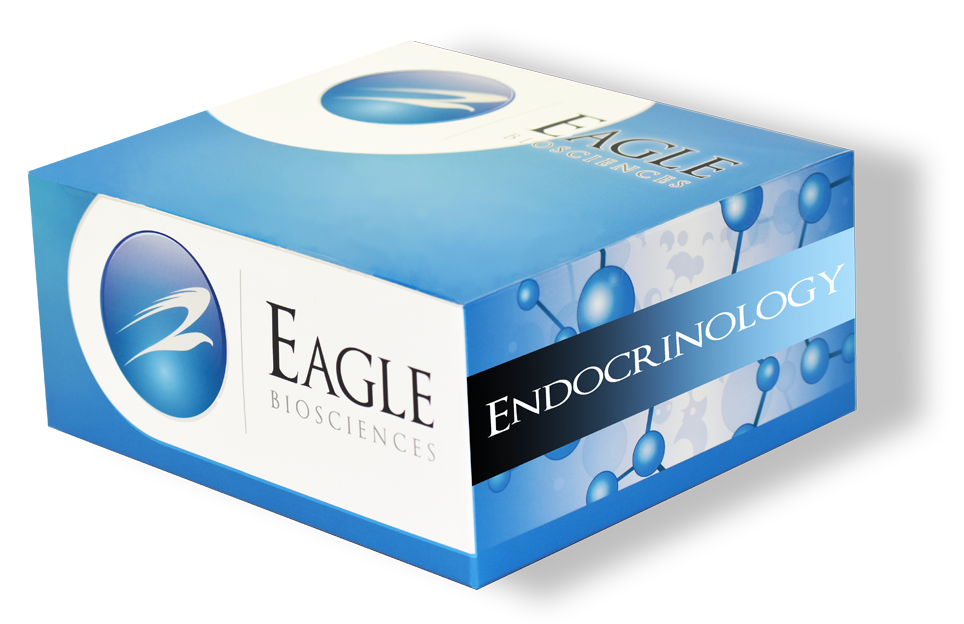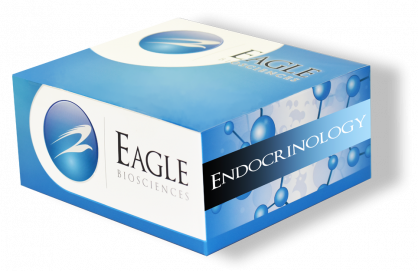High Sensitive Irisin ELISA
$1,620.00
The High Sensitive Irisin ELISA Assay Kit is intended for the quantification of Irisin in plasma (EDTA) samples. The Eagle Biosciences High Senstive Irisin ELISA Assay Kit is for research use only and should not be used for diagnostic procedures.
High Sensitive Irisin ELISA
The High Sensitive Irisin ELISA is For Research Use Only
Size: 1×96 wells
Sensitivity: 1.29 ng/ml
Dynamic Range: 0.1-1000 ng/mL
Incubation Time: 5 hours
Sample Type: Plasma
Sample Size: 50 µL
Alternative Name: Human hs-Irisin ELISA
SAMPLE COLLECTION & STORAGE INFORMATION
The sample collection and storage conditions listed below are intended as general guidelines.
Blood collection- Collect blood samples into tubes containing EDTA. Gently rock the tubes several times immediately to prevent coagulation. Transfer the blood from tubes to centrifuge tubes containing aprotinin (0.6 TIU/ml blood) and gently rock for a few times to inhibit activity of proteinases. Centrifuge the blood at 1600 x g for 15 minutes at 4°C and collect plasma. Plasma can be kept at – 80°C up to 1 month.
Assay Principle
This is a Competitive Enzyme Immunoassay for the quantification of Irisin in Serum and plasma samples. This assay employs the competitive enzyme immunoassay technique. A secondary antibody has been pre-coated onto a microtiter plate and nonspecific binding sites were blocked. Fc regions of primary antibodies specific for target peptides can bind to the secondary antibodies on microtiter plate. The Fab regions of primary antibodies are competitively bound by biotinylated peptide and targeted peptides in samples or standards. The biotinylated peptide interacts with streptavidin-horseradish peroxidase (SA-HRP) which catalyzes the substrate solution. The reaction is monitored by a color change which is readable at OD of 450 nm±2 nm. Quantification of unknown samples is achieved by comparing their absorbance with a reference curve prepared with known standards. The intensity of color development is inversely proportional to the amount of Irisin in the samples.
Related Products
Irisin ELISA Assay Kit
High Sensitive CRP ELISA Assay
Assay Background
This gene encodes a secreted protein that is released from muscle cells during exercise. The encoded protein may participate in the development of brown fat. Translation of the precursor protein initiates at a non-AUG start codon at a position that is conserved as an AUG start codon in other organisms. Alternative splicing results in multiple transcript variants. Irisin: mediates beneficial effects of muscular exercise. Induces browning of white adipose tissue by stimulating UCP1 expression, at least in part, via the nuclear receptor PPARA.
Assay Procedure
1. Add 50 μl of 1X assay buffer as Total Binding. Keep another Two Empty Wells as Blank.
2. Add 50 μl of peptide standards (1000 ng/ml, 100 ng/ml, 10 ng/ml, 1 ng/ml and 0.1 ng/ml), 50 μl positive controls or 50 μl samples into corresponding wells. It is advisable to assay each condition in duplicates.
3. Add 25 μl of primary antibody into each well except the Blank wells.
4. Add 25 μl of Biotinylated peptide into each well except the Blank wells. It is not recommended to use a multi-channel pipette to load the primary antibody and biotinylated peptide.
5. Seal the microtiter plate with acetate plate sealer (APS). Incubate for 2 hours at room temperature (20-23°C). Orbital shaking at 300-400 rpm with a microplate shaker is recommended.
6. Centrifuge Streptavidin-HRP vial to spin down the solution in the vial and pipette 12 μl of Streptavidin-HRP into 12ml of 1X Assay buffer. Vortex thoroughly. Prepare fresh.
7. Remove sealer from plate.
8. Aspirate each well and wash, repeating the process 3 times for a total 4 washes. Wash by filling each well with 1× Assay Buffer (350 μl) using a squirt bottle, manifold dispenser, or autowasher. Complete removal of liquid at each is essential to good performance. After the last wash, remove any remaining Wash Buffer by aspirating, decanting or blotting against clean paper towels.
9. Add 100 μl diluted Streptavidin-HRP solution into each well.
10. Reseal the plate with sealer. Incubate for 1 hour at room temperature (20- 23°C). Orbital shaking at 300-400 rpm with a microplate shaker is recommended.
11. Remove sealer from plate.
12. Wash as according to step 8.
13. Add 100 μl TMB substrate solution into each well.
14. Reseal the plate with sealer. Incubate for 1 hour at RT. Orbital shaking at 300-400 rpm with a microplate shaker is recommended. (Protect from light).
15. Remove sealer from plate. Add 100 μl 2N HCl into all wells to stop the reaction, gently tap the plate to ensure thorough mixing. The color in the well should change from blue to yellow. Go to the next step within 20 minutes.
16. Read the OD with a microplate reader at 450 nm immediately.
Package Inserts
Please note: All documents above are for reference use only and should not be used in place of the documents included with this physical product. If digital copies are needed, please contact us.


